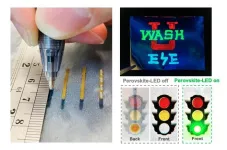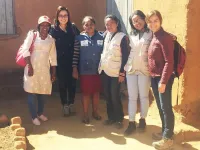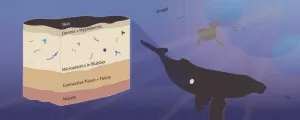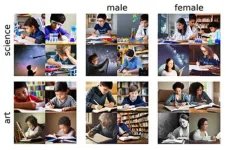(Press-News.org) A Monash University-led study has proposed a solution for the urgent need to capture real-time data on the impact of climate change-related events on human health, healthcare workforces, and healthcare systems at the point of care.
As the global community faces growing climate challenges, the study calls for action, collaboration, and innovation to safeguard human health and wellbeing in the face of environmental crises.
Published in the Journal of the American Medical Informatics Association, it highlighted key climate and natural disaster-related concepts, such as heatwave and drought, that need to be integrated in standardised medical terminology.
Monash University Nursing and Midwifery Associate Professor Zerina Lokmic-Tomkins led the project with an international group of researchers.
“Climate change, a critical risk driver of natural disasters, is rapidly jeopardising global environmental sustainability, planetary health, population health, and sustainable development goals,” Associate Professor Lokmic-Tomkins said.
"Our research indicates that current clinical terminologies lack the necessary depth to capture the full range of hazards associated with climate change, particularly those linked to environmental and meteorological factors.
“This gap hinders our ability to genuinely understand the extent of the impact of climate-related natural disasters on human health, but also how we plan to deliver effective healthcare during disasters, and plan interventions to support healthcare systems in times of crisis."
The study highlighted the need for comprehensive clinical terminologies to capture climate-driven disaster and hazard-related events that impact human health and the provision of sustainable healthcare services across preparation, response and recovery associated with these events.
It mapped the United Nations Office for Disaster Risk Reduction-International Science Council (UNDRR-ISC)’s Hazard Information Profiles (HIP) to SNOMED CT International, a widely used clinical terminology for electronic health records.
The resulting paper called for global collaboration to expand SNOMED CT International to include unique geographical and regional hazard contexts disproportionately experienced in countries most affected by climate change.
“By including diverse perspectives and contributions globally, the clinical terminology can better reflect global health needs and improve disaster preparedness and response efforts,” Associate Professor Lokmic-Tomkins said.
“This means capturing hazards linked to meteorological clusters, such as heatwaves and droughts, which have significant impact on human health across the lifespan.
“Enhancing globally agreed terminology would enable clinicians, public health officials, and health informaticians to manage vast volumes of clinical data, and retrieve, analyse, and contextualise it to specific climate-related situations.
“This data can be utilised to develop evidence-based interventions, predict future impacts more precisely, and support informed decision-making by policymakers and government leaders for climate change mitigation and adaptation strategies.”
The work uncovered gaps in clinical terminologies available to healthcare professionals during disaster-related events. Notably, hazards related to meteorological, hydrological, extraterrestrial, geohazard, environmental, technological, and societal factors were poorly mapped.
Associate Professor Lokmic-Tomkins said one of the most concerning findings was the absence of hazards such as 'heatwave' and 'drought' in SNOMED CT International.
“These phenomena have intensified due to climate change and have significant impacts on human health, migration patterns, and armed conflict situations globally,” she said. “Correcting this deficit in SNOMED CT is crucial to capturing these events as causative factors of health-related issues.”
The study also highlights inequities in global health information systems infrastructure, particularly in areas where health systems lack the capacity to use standardised terminologies. This data gap further exacerbates challenges in providing basic care for vulnerable populations in resource-limited settings, hindering sustainable healthcare efforts.
"Our work is just beginning,” Associate Professor Lokmic-Tomkins said. “By addressing these challenges and expanding clinical terminologies, we can help develop resilient healthcare and community systems that can effectively cope with the increasing frequency and intensity of climate change-related disasters.”
END
The health impact of climate change is not adequately recorded: study
2023-08-11
ELSE PRESS RELEASES FROM THIS DATE:
New research shows genetic mutation known for Alzheimer’s disease is associated with higher fertility in women
2023-08-10
(Santa Barbara, Calif.) — Previous research has revealed that the Apolipoprotein-ε4 (APOE-ε4) allele increases the risk for a variety of diseases in aging populations, specifically Alzheimer’s and cardiovascular disease. And yet, despite the negative effects of this genetic variant, it remains prevalent in approximately 20% of the human population. In a quest to determine how this negative allele is surviving natural selection, a group of researchers have discovered that the APOE-ε4 allele is associated with higher fertility in women.
In a new paper released in Science Advances, researchers including UC Santa ...
Trinity research looks to Latin America for clues on healthy brain ageing
2023-08-10
Researchers at Trinity College Dublin study the factors influencing healthy brain ageing in Latin American and Caribbean (LAC) countries and find the lessons learned there, can also be applied to home.
Ageing is not a uniform process across the globe. Most research into cognitive and functional ageing has been conducted in the US and Europe, in high-income settings. Researchers from the Global Brain Health Institute (GBHI) at Trinity College are filling the knowledge gap that exists for Latin American populations on the factors ...
Transplant recipients experience limited protection with primary COVID-19 vaccination series, but third dose boosts response
2023-08-10
Key Takeaways
Lung and heart transplant recipients experienced diminished and delayed antibody responses to the first two COVID-19 mRNA vaccine doses, but most developed stronger responses following a third dose
A third dose also boosted cross-protection against SARS-CoV-2 viral variants
For lung and heart transplant recipients, vaccine doses beyond the third dose are likely important for maintaining immunity
BOSTON – Transplant recipients must take life-long immunosuppressive medications to prevent rejection, but these drugs ...
Department of Energy announces $11 million for exploratory research in extreme-scale science
2023-08-10
WASHINGTON, D.C. - Today, the U.S. Department of Energy (DOE) announced $11 million in funding for 15 projects in exploratory research for extreme-scale science that will leverage emerging trends and advances in high-end computing, massive datasets, scientific machine learning, artificial intelligence, and novel computing architectures.
“There is a wide expanse of exciting opportunities as we reach beyond exascale computing,” said Ceren Susut, DOE Acting Associate Director of Science for Advanced Scientific Computing Research. “These ...
Simple ballpoint pen can write custom LEDs
2023-08-10
Researchers working with Chuan Wang, an associate professor of electrical and systems engineering at the McKelvey School of Engineering at Washington University in St. Louis, have developed ink pens that allow individuals to handwrite flexible, stretchable optoelectronic devices on everyday materials including paper, textiles, rubber, plastics and 3D objects.
In a paper published Aug. 7 in Nature Photonics, the team reports their simple and versatile fabrication approach to allow anyone to make a custom light-emitting diode (LED) or photodetector ...
Community health program boosts child vaccinations in remote areas of Madagascar
2023-08-10
URBANA, Ill. – Madagascar is one of the poorest countries in the world and access to health care is limited for many people. Childhood vaccinations are a crucial component of preventative care, but vaccination rates remain below the World Health Organization’s goal of reaching 95% of children. A new study from the University of Illinois Urbana-Champaign examines the effectiveness of a health intervention program that enlists community-based health workers to promote child vaccination uptake.
“Childhood vaccinations are a cost-effective investment that can have large ripple effects. Vaccines can reduce child mortality ...
Athletes have no reason to be concerned by their COVID-19 vaccine this winter but timing matters
2023-08-10
It is now almost a rule of thumb: As soon as an athlete falls to the ground with a sudden cardiac arrest, social media is awash with claims that COVID-19 vaccinations are to blame. This was the case with English footballer Charlie Wyke, cyclist Sonny Colbrelli and, most recently, with college basketballer, and son of LeBron, Bronny James. In the view of Harald Jorstad, Sports Cardiologist at Amsterdam UMC, there is no evidence to support these claims, but timing of the vaccination can be structured to not ...
Microplastics found embedded in tissues of whales and dolphins
2023-08-10
BEAUFORT, N.C. – Microscopic plastic particles have been found in the fats and lungs of two-thirds of the marine mammals in a graduate student’s study of ocean microplastics. The presence of polymer particles and fibers in these animals suggests that microplastics can travel out of the digestive tract and lodge in the tissues.
The study, slated for the Oct. 15 edition of Environmental Pollution, appeared online this week.
Harms that embedded microplastics might cause to marine mammals are yet to be determined, ...
Tool finds bias in state-of-the-art generative AI model
2023-08-10
Text-to-image (T2I) generative artificial intelligence tools are increasingly powerful and widespread tools that can create nearly any image based on just a few inputted words. T2I generative AI can create convincingly realistic photos and videos which are being used more and more for a multitude of purposes, from art to political campaigning.
However, the algorithmic models that power these tools are trained on data from humans, and can replicate human biases in the images they produce, such as biases around gender and skin tone. These biases can harm marginalized populations, reinforcing stereotypes and potentially leading to discrimination.
To address these implicit biases, ...
Chloride Ions From Seawater Eyed As Possible Lithium Replacement In Batteries of the Future
2023-08-10
Sodium, Potassium and zinc have all been promising contenders for lithium’s place in rechargeable batteries of the future, but researchers at Worcester Polytechnic Institute (WPI) have added an unusual and more abundant competitor to the mix: chloride, the richest negatively charged ions in seawater.
Xiaowei Teng, the James H. Manning professor of Chemical Engineering at WPI, has discovered a new redox chemistry empowered by chloride ions for the development of seawater green batteries.
Modern lithium-ion batteries used in various applications, including electric vehicles, can be problematic for grid storage, given their ...





